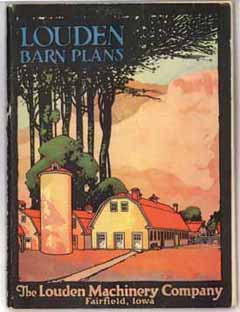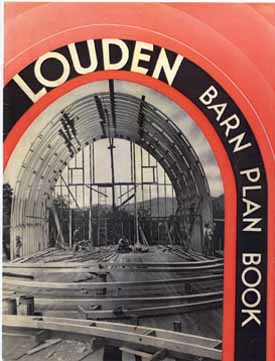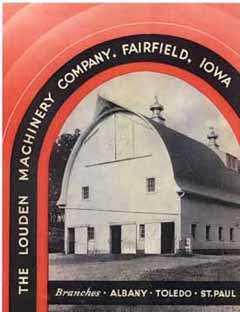 «
»
«
»
 «
»
«
»
William Louden's specialized farm-equipment contributions to dairy farming have been compared to John Deere's and Cyrus McCormick's well-known contributions to grain farmers.
On September 24, 1867 William Louden received his first patent for a device which helped farmers stack hay efficiently. The Louden Machinery Company continued to develop and manufacture a variety of hay tools that allowed a farmer to easily and efficiently move and store hay.
Besides easing the backbreaking labor of 19th century farms, these new inventions meant that barns could be bigger and taller, enabling farms to be larger and more efficient.
Among many innovations, a flexible barn door hanger was introduced in 1895, the forerunner of practically every barn door hanger still used today.
Louden developed more and more laborsaving devices, such as individual easy-to-clean metal cattle-watering drinking cups, which had the advantage of preventing the spread of disease between cows.
In 1907 a free barn planning service was begun to help farmers erect more efficient barns (designed to use Louden barn equipment, of course).
By 1939 over 25,000 original Louden barn plans had been distributed all around the world. Tens of thousands of additional barns were equipped or retrofitted with Louden products.
During World War One manufacturers began to see that Louden's monorail overhead traveling crane system could speed up production and save money, and Louden's reputation for innovation, reliability and quality allowed them to expand this new market opportunity. Soon this division became predominant.
Louden was chosen to construct the material handing devices for the manufacture of atomic bombs in Oak Ridge, Tennessee. Naturally, recognition for this could not be given to Louden until security restrictions were lifted (after the bombs were used in Japan).
Two later contracts of note: In the 1960's Louden built 27 cranes and other devices to handle NASA's Apollo space booster rocket at Huntsville, Alabama, including two miles of track.
In 1961 it supplied overhead cranes for a Boeing plant in Wichita, Kansas, which assembled B-52H airplanes.
By World War Two many major manufacturers used Louden material handling equipment. This included Boeing, in their B-29 airplane plants.
Although the company has changed hands many times since 1953 (when the Louden family sold the company), the Louden name is still used on material handing equipment, reflecting Louden's sterling reputation. Production has moved away from Fairfield.
To look at old catalogue pages and discover much more about the Louden Machinery Company, go to the Louden Company History website.
See current Louden products produced by Acco-Louden, then click on "Cranes" under "Louden".
Catalogue front cover, 1919
Louden Barn Plan Book front cover, from about 1935.
Catalogue back cover c. 1935.